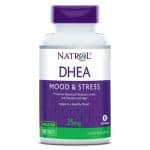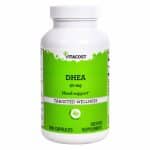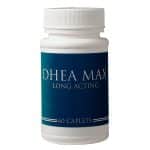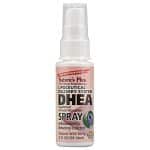The Alzheimer's disease is a brain disorder named after German physician Alois Alzheimer, who first described it in 1906. Patients with Alzheimer's disease have high levels of cortisol (the “stress” hormone) and a cortisol/DHEA imbalance. In a group of people severely affected by Alzheimer's disease, the level of Dehydroepiandrosterone sulfate (DHEA-S) was remarkably low.
How DHEA Helps Overcome Dementia Induced by Alzheimer's Disease
HD Danenberg reported findings in 1996 that may help explain a key aspect of DHEA's anti-dementia protection.
Beta Amyloid (Aß) protein is one of the main components of senile plaques, a distinct lesion of brain tissue in patients with Alzheimer's and dementia. Toxic amyloid deposits, which gradually kill brain cells, are produced from an amyloid precursor protein (APP) according to a specific enzymatic pattern – the “amyloidogenic” pattern.
DHEA treatment alters this pattern by rendering it non-amyloidogenic, which prevents the gradual accumulation of toxic Aß proteins seen in the elderly. These non-toxic isoforms possess neuroprotective properties and participate in neurite outgrowth. Thus, not only does the production of amyloid precursor proteins become harmless through this non-amyloidogenic pattern.
It is possible that the decline in DHEA levels associated with aging may contribute to the harmful process of production of amyloid precursor proteins and thereby to the development of Alzheimer's dementia. Therefore, there is hope for protecting aging brain structure and function through long-term DHEA supplementation.
Clinical studies
- D.Rudman, K. Shetty and D. Mattson published a major study on DHEA in the elderly in 1990. They compared the level of DHEA-S in 50 men aged 55-94 living independently with that of 61 men aged 57 to 104 living in a retirement home. DHEA-S levels were significantly lower in those living in nursing homes, who were generally more senile than those living independently. Plasma DHEA-S was below normal (less than 30 mcg/dL) in 40% [25] of nursing home residents compared to only 6% [3] for those living at home. In men living in nursing homes, plasma DHEA-S was inversely related to the presence of impaired mental capacity syndrome, Alzheimer's dementia, or dementia due to other causes, as well as the degree of dependency for activities of daily living. Plasma DHEA-S was below normal in 80% of nursing home men who required constant care. In people with Alzheimer's dementia or dementia related to other causes, the prevalence of low DHEA-S was 68% and 100%, respectively.
- B. Nasman compared 45 Alzheimer's dementias and 41 dementias due to other causes with a control group of elderly people. It states that: “Patients with Alzheimer's dementia and dementias due to other causes have significantly lower serum DHEA-S levels than people in the control group. The ratio of plasma cortisol to serum DHEA-S was higher in people with dementia than in those in the control group. This suggests that DHEA acts as an antiglucocortiticoid. A high level of cortisol relative to that of DHEA-S in people with dementia can thus damage the cells of the hippocampus. These brain memory cells die in dementia because these neurons are particularly sensitive to the toxic effects of corticosteroids.
- Other studies have examined the role of Vascular Endothelial Growth Factor in people with Alzheimer's. This growth factor has been shown to protect the brain and scientists now believe that low levels of Vascular Endothelial Growth Factor are linked to the progression of Alzheimer's disease. DHEA-S has been shown to significantly increase the bioavailability of Vascular Endothelial Growth Factor in the brain, leading the study authors to conclude that DHEA treatment would be beneficial in people with Alzheimer's as well. than in older people in general.




